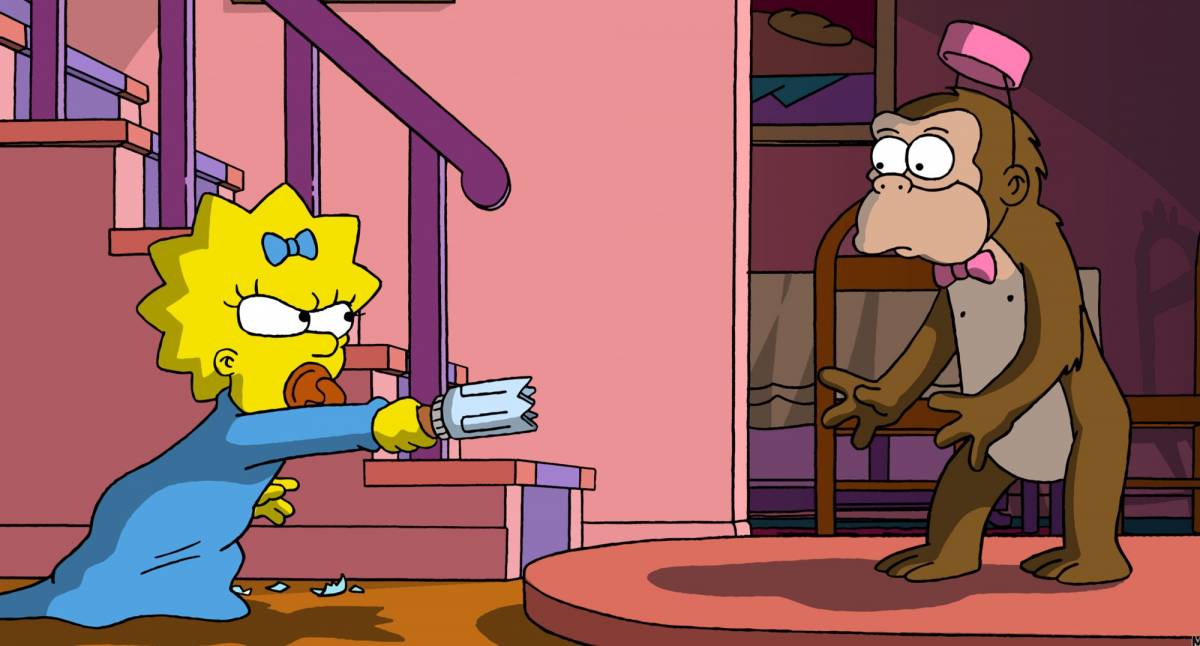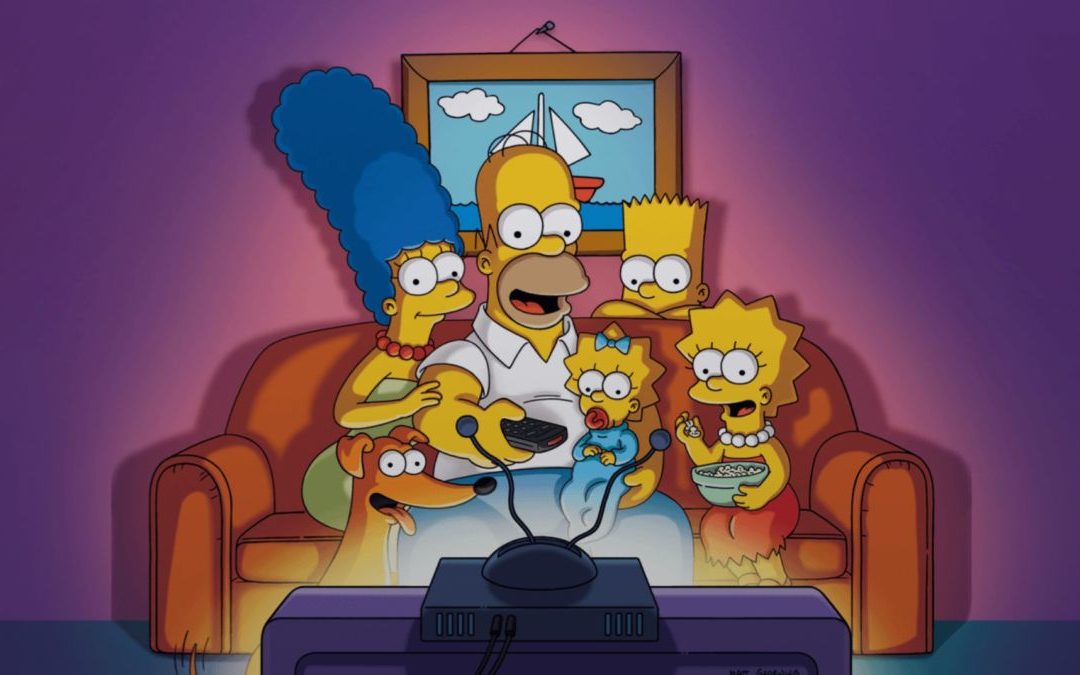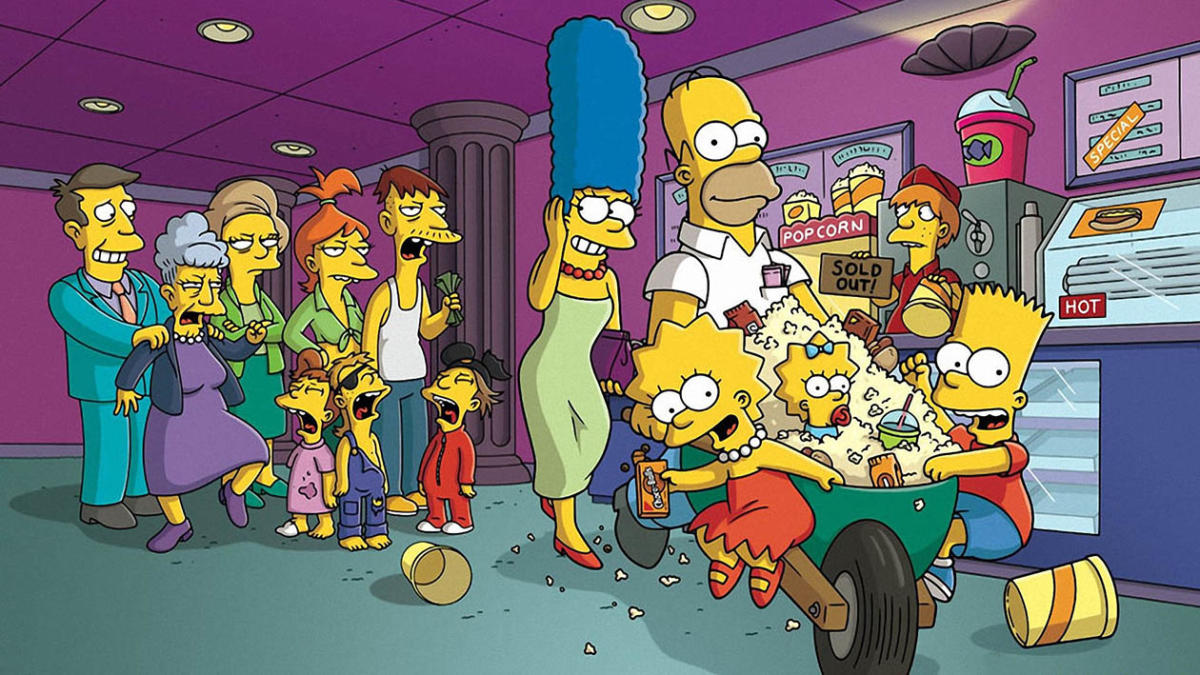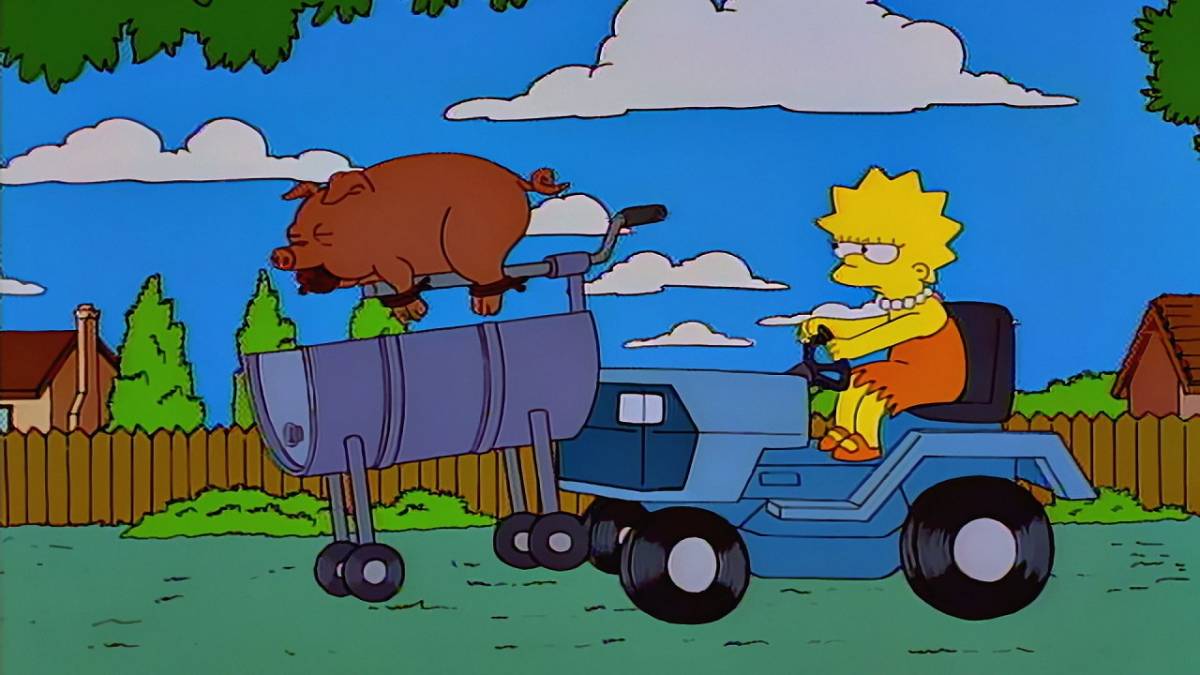Let’s get this out of the way now – Troy McClure said it in 1995 and I’m saying it again, practically speaking The Simpsons will never end until the day the show becomes unprofitable. Further, that day is unlikely to be any time soon. In 2008, a Newscorp mandarin described the franchise as “the biggest licensing entity Fox has ever had, full stop” – and that was before it fell into the cold, cunning, reptilian hands of Disney, who would sell Bart’s organs for dog food and have Marge walking the street if it helped the bottom line.
(Michael ‘Mickey’ Mouse himself has run through no less than eight different voice actors. It is unthinkable that even the death of Dan Castellaneta would stop Disney finding a new voice for Homer, who once claimed he had been a political prisoner because he “kicked a giant mouse in the butt”.)
Narratively speaking is a different matter, and because of the weird stasis of The Simpsons universe any kind of advancement, ending or otherwise, would be a dramatic shock to the system. The Simpsons has dealt with the passage of time by poker-facedly pretending not to notice it’s happening.
Originally Homer and Marge were in high school and first dated in the 1970s, then married and had children through the 1980s. Then, a 2008 episode screwed with the chronology to place them as a young couple in the 1990s, against the backdrop of Homer’s Nirvana cover band – since otherwise they should have been approaching their sixties. If the show carries on like this, before long Homer and Marge will be millennials, yammering about Pokemon and explaining what a dial-up modem sounded like to their disaffected children.
The flash-forward episodes, too, have found themselves undone by the passage of time. The first of these, ‘Lisa’s Wedding’, was aired in March 1995 and took place in the far-off, futuristic year of 2010 AD. But March 2010 rolled around sooner than they’d dared to think, and when it did Lisa was not a young adult engaged to be married, but remained an eight-year-old. There have been several more flash-forwards since then, and while ‘Bart To The Future’ didn’t give a year, the next, ‘Future-Drama’, was set in 2013, which like 2010 has already been and gone.
Even the changes the show does attempt to slip by are largely surface-level. The TV goes from a chunky old box to a HD flatscreen, but this has zero impact on the core concept of a suburban nuclear family – an idea which is, itself, now irrevocably dated. How many single-income households do you know, especially in the Simpsons’ tax bracket? How many union men still punch in for a nine-to-five at some big industrial concern in middle America?
So despite a few superficial changes, mainly to do with the advent of smartphones, as the decades have rolled on the show has found itself in a Groundhog Day scenario, where the family stay the same ages and are locked in the cycle of school, homemaking, and working at the plant forever, like some Sisyphean hell. Were they to become aware of this endlessness, it could be the raw material of an ending, although works which become that meta have a worrying tendency to disappear – not through the fourth wall, but up their own arse.
But an ending, typically speaking, is an ending rather than the same thing happening over and over as we fade to black. It is a conclusion to the overrunning narrative, and here we run into the issue that The Simpsons, more than most other animated sitcoms, is a series of self-contained episodes. At times it even actively resists having any kind of narrative through-line, with Judge Snyder memorably forbidding anyone from mentioning the real Seymour Skinner ever again “under penalty of torture”. The only change to the main family it’s seen through its thirty years is Lisa becoming a vegetarian, hardly a stretch for her character.
As the show itself once said of the retirement of a showbiz long-runner, “Why now? Why not twenty years ago?” – and aptly, over the years some episodes of The Simpsons have been interpreted as what could have been natural stopping points. Some – but not all – of these generally hover around the area of the show’s much-remarked-upon decline, and of them probably the best option was the eleventh season finale, ‘Behind The Laughter’.
‘Behind The Laughter’ noted that the show was relying more on celebrity guests and outlandish plots, making particular mention of the episode with the real Seymour Skinner, and even went so far as to mock the idea of the show carrying on. In a special sneak preview of the next season, it gives us the suitably rote exchange “I can’t believe it! We won another contest!”/“The Simpsons are going to Delaware!” while Homer, looking on in the editing booth, advises “This’ll be the last season.” This was the last great hurrah of the golden years, but not the last season, not by a long shot.
(For natives of the UK, this holds particular salience as a watershed moment, since it was on the advent of the twelfth season that The Simpsons moved from BBC 2 to Channel 4. A £15 million white elephant, to be sure, but at least at that point the good episodes outnumbered the bad.)
Then-showrunner Al Jean actually suggested that ‘Behind The Laughter’ could have been a potential finale in an interview, noting “Every year, we have a couple where I go, ‘Oh, that would have been a great one’”.This begs the question – did the writers ever consciously create an episode as a potential ending? ‘Behind The Laughter’ certainly had the air of being the end of an era, and season 7’s finale, ‘Summer Of 4 Ft. 2’, would have cut things off prematurely, but did literally end on the family driving off into the sunset.

More seriously, though, in 2011 Fox outright said “we cannot produce future seasons under its current financial model” – yes, the show had finally become unprofitable, or rather, Fox could have made more money by axing it and farming it out on a new syndication deal. Eventually a deal was hammered out where the cast took a substantial pay cut, but in the meantime, season 23’s ‘Holidays Of Future Passed’ was written as a potential finale. Aptly, this was another of the flash-forwards, a little more than 23 years advanced from the show’s 1990s stasis, but not too far away either. Even if this was a sappy feel-good effort, having the Simpson children themselves all fumbling through parenthood, it was hailed as a particular highlight within the doldra of the 23rd season – and, like the pilot, it was a Christmas special, so would have brought the show full circle.
The instinctual argument is that any good finale should focus on the Simpsons family itself, and be heartwarming and conclusive in that regard – and ‘Holidays Of Future Passed’ fits that bill, but this also misses the point of the show entirely. From the first episode, which ruthlessly toyed with the well-trod plotline of saving Christmas (“It happened to Charlie Brown, it happened to the Smurfs, and it’s gonna happen to us!”) The Simpsons was always a small-r reactionary endeavour, deeply aware of its sitcom predecessors and seeking to parody them as incisively as possible.
This was shot through it from the start. The grand central joke of it was that, after fifty-odd years of saccharine sitcoms, here finally was a teevee family where father emphatically did not know best (a style which proved so successful it’s been mimicked by more or less every teevee family since). Further, it’s used more specific parodies with a verve that’s never quite been bettered – most obviously in the Halloween specials, which neatly encapsulate the plots of two-hour horror flicks in seven-minute shorts and make them funny.
So just as its first was the Christmas-special setup that had been used a million times before, it would make sense for its last to also be treading familiar ground. And were it to use a familiar plotline, the medium of television – which, it’s reckoned, hit its golden age in the late 1990s, around the same time that The Simpsons was still in its own – has provided some genuinely iconic endings. It’s no stretch of the imagination that the show which had its own go at shooting J.R might draw on a familiar well again, and here are some of the ways that might happen:
Malcolm In The Middle ending
Malcolm In The Middle was a similarly family-led sitcom on the face of things, revolving around a dysfunctional suburban family with bleak lives and bills to pay. It’s hard to imagine it ever would have come to be without the influence of The Simpsons, and while it’s far from a rip-off it definitely shows its influence, with most of the family members occupying similar roles and functions (although Jane Kaczmarek’s Lois is a far livelier creation than the deliberately staid Marge). Indeed, in a lot of outlets it and The Simpsons would go out back-to-back.
However, it had a distinct advantage over The Simpsons in coming to a natural end, and that was that its cast were people of flesh and blood rather than ink and paper. To put it simply, they aged, rather than remaining eternally in an early-1990s time capsule. As such, it’s not hard to imagine the Simpsons, as time goes by, following a similar path to the Inthemiddle clan – and this would bring their story to a naturalistic end, rather than something wacky and outlandish involving magic robots.
Homer and Marge have another child – they may not be happy about it, but damned if they’ll make that the child’s fault. Maggie not only speaks but proves herself the most robust of the siblings, at times even surpassing her gifted older sister, and caring for her younger sibling in a way unprecedented in that household. Bart has as wayward an adolescence as you might expect, and destroys more than one car, but eventually gets the first of the menial jobs with which he works out all his aggression before going to law school. Lisa makes it into an Ivy League – even with a scholarship she has to work like a dog to support herself, but she makes it, there was never any doubt of that. And, yes, there’s a non-zero chance she becomes President, maybe even a good President too. The flash-forward ‘Bart To The Future’ saw her installed as “America’s first straight female President”, an achievement which at the time of writing is still up for grabs.
The Wire ending
https://www.youtube.com/watch?v=9j0MitrXWag
Homer, long since estranged from his family and having lost his job as a result of his latest zany scheme, pauses on the highway to look out over Springfield. Springfield, [unspecified state], USA, a stand-in for all of America’s small-town cities with all the same systems and all the same problems. As the theme tune swells we see Springfield’s denizens, now a little older and perhaps even a little wiser, stepping into the societal roles that were always there for them, that others have held before and others will hold after.
Nelson drops out of school and sticks up the Kwik-E-Mart. Martin burns out, puts on some weight and runs the Android’s Dungeon, the acerbic lord of his own petty fiefdom. Ralph beams with pride as he’s sworn into the force by Eddie, the chief ever since Clancy had a mild heart attack and retired. Smithers steps into the top job at the plant, now forever empty and bitter after the death of the only man he ever loved.
Bart sires the first of his own brood of bratty children with the younger sister of Sherri and Terri, who now serve as his insufferable chain-smoking sisters-in-law. Lisa, having stoically endured the horrors of a Springfield childhood, finally escapes the horrible cycle by heading off to college – but Maggie is by now about the right age to replace her as misunderstood child who will not fare well in the school system, and moreover, will get swept up in the wacky adventures that inevitably befall a Simpson child. The game don’t stop, cats keep playing.
Blackadder ending
Like Blackadder, this is a period piece, in this case to have a hope in hell of trying to resolve the chronology. With Bart pegged at ten at the start of the show, the very last and greatest gasp of Generation X, he would have been a young man at just about the turn of the millennium – the time when the War on Terror began.
Between his distaste for formal education and Springfield’s generally run-down qualities, the army may have ended up a surprisingly attractive option. Maybe in these gender-neutral times Lisa would have taken the same path – unlikely, but she did once express admiration for the first female stealth bomber pilot (“During the Gulf War, she destroyed seventy mosques, and her name is Lisa too!”). However, whereas Lisa would have the education for the officer corps, there’s no way Bart would end up as any sort of person other than grunt.
So even over in the shattered ruins of Iraq and/or Afghanistan, there’d be the same sort of wit and wacky adventures, and maybe some familiar faces – Skinner’s almost certainly too old by now to be an active duty NCO, but Springfield Elementary must produce more than its share of cannon fodder. Milhouse, whose ideal career was once predicted to be ‘military strongman’, isn’t a bad fit for the role of a Baldrick-esque loyal idiot subordinate. Eventually, though, because of the kind of commanding officer you’d get in The Simpsons (Colonel Quimby?), Bart and the rest of his battalion will be sent over the top, into a battle they cannot win. Good luck everyone, fade out, roll credits. They aren’t all happy endings.
My Name Is Earl ending
The Simpsons is inordinately fond of biting the hand that feeds it, lobbing any number of barbs at the Fox network, its former owner “the billionaire tyrant” Rupert Murdoch, and even at its own audience. But My Name Is Earl may have pipped it in that regard, since it ended on a king-sized cliffhanger – intended as a deliberate trolling of everyone watching and a middle finger to the network, since the writers knew it had been cancelled and that episode would be its last.
In Earl’s case this was by dropping in a massive question – who was Earl Junior’s real father? – which would never, ever, be resolved. As mysteries go, the obvious option for The Simpsons is the actual location of Springfield, although our could-have-been ending ‘Behind The Laughter’ put the capper on that running joke by quite casually referring to “this Northern Kentucky family”.
Besides, what’s needed here is not just a question which will never be answered, but one which, unlike Springfield’s location, could turn everything on its head. Is it worth trying to suggest that Bart, Lisa, or Maggie were the product of an affair? Probably not – Homer and Marge have both been tempted, but never strayed. While we’re on the subject of paths not taken, though, just imagine the outrage if The Simpsons had ended on the first part of ‘Who Shot Mr. Burns?’, and never resolved that cliffhanger.
However, we have more than once seen one-off character groups intended as too similar to the Simpsons themselves for comfort – not least Bart’s rival from his war against neighbouring mirror-city Shelbyville, and the boy’s Homerish father. So it’s possible that the Simpsons would end up in a room with their doppelgangers, and then Grandpa, honest Abe, the most overlooked Simpson yet still the maddest and firiest, pipes up “I can explain-” and then a smash cut to the credits.
(Abe does of course have form for siring bastard children – remember Danny DeVito’s cameos as Homer’s long-lost brother?)
This is if anything more of a tease than Earl’s ending, since Abe’s grandiloquent and surreal explanations of the past were always things of beauty. To be denied that is, really, a sign that it’s time to go.
The Sopranos ending
This isn’t what you think. The Sopranos’ infamous final cut to black has become a punchline in and of itself, but what this draws on is, instead, everything that led up to that point. The Sopranos, remember, were much like The Simpsons in that they were a dysfunctional family who audiences embraced not in spite of their faults but because of them – to say nothing of the main man being a hefty balding patriarch, who was threatened in his role as head of the family by the changing culture of the naughty ‘90s.
Knowing this, David Chase played a game of chicken with his audience, having Tony Soprano do ever more despicable things to see if there was any depth he could sink to that would make them turn on him. For much of the audience, there wasn’t, and so it was Chase who broke first and ended on that deliberately frustrating black screen.
Homer himself has clocked up a number of repugnant moments, handily described as the ‘jerkass Homer’ tendency, but the difference is that unlike in Tony’s situation, the rest of the Simpsons aren’t culpable. The rest of the Soprano family – in both senses of the word – were living off the proceeds of crime and murder from the beginning. So the ending here must be Homer committing another monstrous act, and the rest of the family being complicit, or perhaps even joining in.
Naturally I’ve gone with Homer as our Tony-analogue, but the tenth Halloween special had a fitting sequence in which Marge thought she had killed Ned Flanders with the car, and then the family swore each other to secrecy and covered it up. Flanders, the true innocent, is certainly the kind of victim to mark a serious moral turning point. But if there’s a real final boss of The Simpsons, someone who could play the same role as Frank Vincent’s rival don in the last season of The Sopranos, it can only be Mr. Burns. And this would not be an accident in a non-canon vignette – this would be something unforgivable.
What’s the motive? Pick one. As ‘Who Shot Mr. Burns?’ told us, everyone in town has a reason. And Burns is no friend of the Simpsons, they torpedoed his run for governor and Maggie shot him, it’s entirely possible he would come at them in some way.
But they’re well-placed to come back at him, if it really comes to it. We saw Bart and Lisa break into Burns manor in ‘Two Dozen And One Greyhounds’. Marge, unthinkable as it might be, could exploit Burns’s crush on her from ‘Marge Gets A Job’. Like in The Sopranos, there’s a non-zero chance the FBI would be willing to help in this final battle, since they’re still after Burns for stealing that trillion-dollar bill. And from there, Maggie can simply gun him down – or, much more likely, Homer lashes out like in ‘Homer The Smithers’ and physically beats the old man to death.
After that, it’s a matter of living with it. And if they could carry Flanders on their conscience, you’d imagine they can carry Burns. But step back a minute – the Simpsons, the chummy old yellow family, have crossed a moral horizon. And just as The Sopranos’ final scene was a bleak parody of the family togetherness of the first season’s finale, the last episode of The Simpsons’ first season saw Marge reassuring Homer “you raised three children who could knock out and hog-tie a perfect stranger, you must be doing something right”. Here, in the same kind of bleak parody, Homer would have succeeded as husband and father in that he would have a family who – like Tony’s – are capable of killing a man.
(If you must have the cut to black, then presumably Smithers bursts out of the bathroom with a gun during the credits.)
Some of the coverage you find on Cultured Vultures contains affiliate links, which provide us with small commissions based on purchases made from visiting our site.



